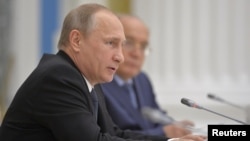Russian President Vladimir Putin recently signed into law a bill giving prosecutors the power to declare foreign and international organizations "undesirable" in Russia, shut them down, and punish any Russian citizens involved. Supporters say the legislation is to prevent threats to Russia's constitutional order, defense, or state security.
Rights activists say it extends a crackdown on dissenting voices that criticize or challenge Putin's rule.
Putin quietly signed the bill on “undesirable” foreign and international organizations into law after little debate and only a few quick readings in the Duma, Russia's parliament.
The response to this latest legal threat to civil society groups, however, was loud cries of opposition, both foreign and domestic.
Condemnation of law
The European Union and the United States condemned the law, which allows prosecutors to not only shut down foreign NGO's but also to punish Russian citizens involved with them.
The vague measure allows for interpretation on what is considered "undesirable" while specifying fines or prison terms of up to six years for repeat offenders.
Russia's rights ombudsman, Ella Pamfilova, this week criticized the new law for lacking any legal ground. She said the power to declare groups "undesirable" without going to court was against the constitution and criticized the failure to allow the right of appeal.
Russian anti-corruption campaigner Alexei Navalny on Thursday said he believes the law adds to previous restrictions aimed at keeping Putin in power. He spoke in an exclusive interview with VOA's Moscow bureau.
"I think this is very strongly connected to the 2015 and 2016 elections." he said.
"For the Kremlin, it's extremely important to eliminate any NGO's that could not only finance but could also develop programs, gather people, or be an intellectual center. Putin wants to clear the field of any organized structures," he added.
Navalny, however, went on to explain he thinks the Kremlin's actions are not completely cynical.
"I think that it's part of paranoia of Putin and his circle," he said, adding, "first of all the secret services, who still believe that foreign money comes to the opposition. They can't believe that Moscow protests in 2011 and 2012 happened on their own as the result of Putin's corruption," he added.
Navalny was one of the main leaders of the anti-government protests that challenged Putin's continued rule with street demonstrations numbering over 100,000 people. He was frequently arrested and only recently released from house detention.
Putin's supporters say the tighter regulations will help prevent Western forces from sparking a revolution against the Kremlin.
In 2012, they passed legislation allowing the branding of any group that receives foreign funding and engages in activity deemed political as a “foreign agent.”
Some 64 organizations have been designated as “foreign agents” and have to register as such or pay thousands of dollars in fines.
Human Rights Watch program director Tanya Lokshina said a number have closed down because of the label, which implies being a spy or traitor.
“The new law on undesirables is definitely part of the same trend of repression against independent voices but it takes it even further," she said. "While supposedly aiming to prevent foreign and international groups from undermining national security, it is evidently meant to silence Russian groups and activists and cut them off from international networks, from their friends and partners from the international community.”
She says the new undesirable law is part of a crackdown on independent voices unleashed with Putin's return to the Kremlin three years ago.
Kremlin targets critics
The Kremlin has also fueled a campaign to label its critics as part of a “fifth column” of national traitors that includes well-known opposition leaders like Navalny.
A young and unknown lawmaker in Russia's parliament, Vitaly Zolochevsky, requested five organizations be investigated under the new “undesirables” law.
He pointed the finger at Human Rights Watch, Amnesty International, the Carnegie Center Moscow, Transparency International, and the Russian organization Memorial International.
Memorial's Human Rights Center was already labeled a “foreign agent” and board member Oleg Orlov says Zolochevsky's move seems aimed at gaining popularity.
Orlov says the lawmaker "... wants to run ahead and take initiative, to promote himself - to be more Catholic than the pope, so to speak," adding,"He wanted to be the first to use the law as soon as it took effect."
Orlov says while the law on foreign agents strangles Russians who work inside Russia, the law on undesirable organizations isolates Russian organizations from their international partners.
Russia's Justice Ministry this week placed a leading scientific group, the Dynasty Foundation, on its “foreign agent” list.
Officials defended the action, saying the designation poses no threat to any organization's existence and just requires transparency in foreign financing.
The Russian businessman who leads Dynasty, told the Interfax news agency he would stop funding the foundation because of the “foreign agent” label.










